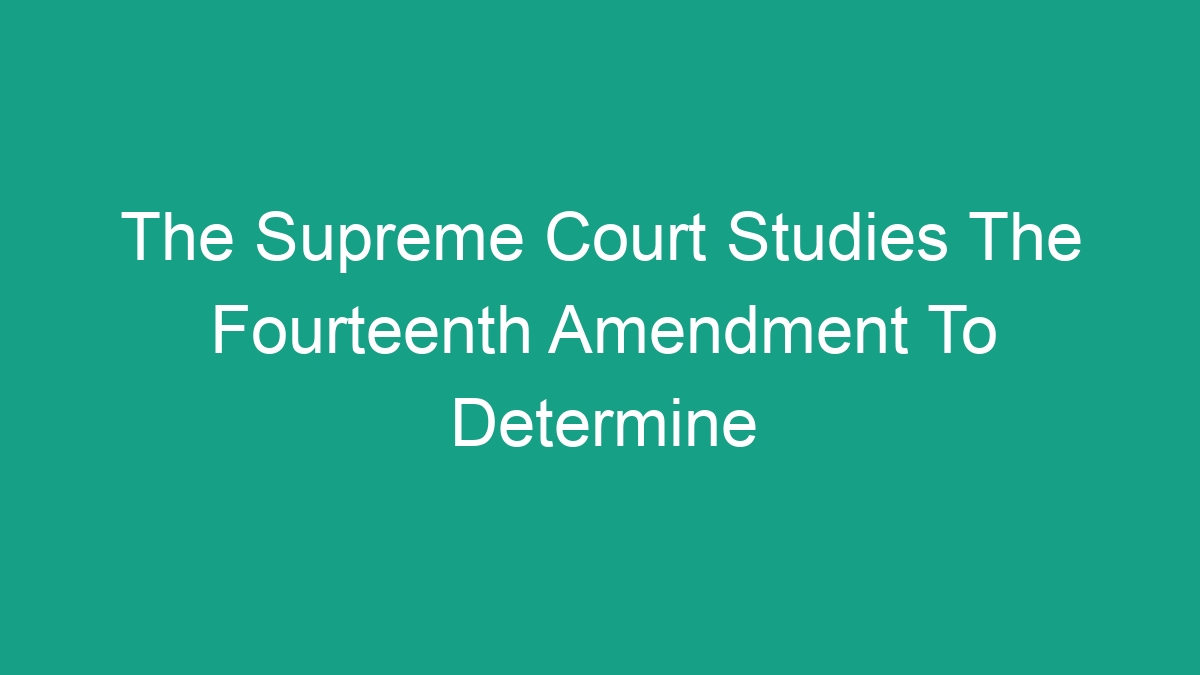
Introduction
The Fourteenth Amendment to the United States Constitution has been a subject of great importance and significance in the legal and judicial system. It addresses the rights of citizens and has been interpreted and applied to a wide range of issues throughout history. One of the key players in interpreting and applying the Fourteenth Amendment is the United States Supreme Court. The Supreme Court has continuously studied the Fourteenth Amendment to determine its scope, application, and implications in various cases. This article aims to explore the Supreme Court’s study of the Fourteenth Amendment and its impact on the legal landscape.
Background of the Fourteenth Amendment
The Fourteenth Amendment was adopted in 1868, following the Civil War, with the primary goal of ensuring the equal treatment and protection of all citizens under the law. It consists of several crucial provisions, including the Equal Protection Clause and the Due Process Clause. The Equal Protection Clause mandates that no state shall deny any person within its jurisdiction the equal protection of the laws. The Due Process Clause, on the other hand, prohibits the government from depriving any person of life, liberty, or property without due process of law.
The Fourteenth Amendment significantly expanded the rights and protections of individuals, especially in the context of civil rights, equal treatment, and due process. Over the years, the Supreme Court has been tasked with interpreting and defining the scope of these provisions, which has led to numerous landmark decisions and legal precedents.
Supreme Court Interpretation of the Fourteenth Amendment
The Supreme Court’s interpretation of the Fourteenth Amendment has been pivotal in shaping the legal landscape of the United States. Through its rulings, the Court has addressed issues such as racial segregation, gender equality, LGBTQ+ rights, affirmative action, and many others, all within the framework of the Fourteenth Amendment.
One of the most well-known cases involving the Fourteenth Amendment is Brown v. Board of Education (1954), in which the Supreme Court unanimously held that racial segregation in public schools was unconstitutional. This decision was based on the Equal Protection Clause of the Fourteenth Amendment, marking a significant milestone in the fight for civil rights and equality.
In Roe v. Wade (1973), the Supreme Court invoked the Fourteenth Amendment’s Due Process Clause to establish a woman’s constitutional right to have an abortion. This decision not only addressed reproductive rights but also expanded the understanding of individual autonomy and privacy under the Fourteenth Amendment.
Similarly, in Obergefell v. Hodges (2015), the Supreme Court ruled that same-sex marriage is protected by the Fourteenth Amendment, emphasizing the fundamental right to marriage and equal treatment under the law.
These landmark cases and many others demonstrate the Supreme Court’s ongoing study and interpretation of the Fourteenth Amendment to make determinations on crucial legal and societal issues.
Contemporary Issues and the Fourteenth Amendment
The Supreme Court continues to grapple with contemporary issues that implicate the Fourteenth Amendment. One such issue is affirmative action in college admissions. In Fisher v. University of Texas (2016), the Court upheld the use of affirmative action in college admissions, citing the compelling interest in diversity and the framework of the Fourteenth Amendment’s Equal Protection Clause.
Another contemporary issue is the Voting Rights Act and its relationship to the Fourteenth Amendment. In Shelby County v. Holder (2013), the Supreme Court struck down a key provision of the Voting Rights Act, raising questions about voting rights, racial discrimination, and the application of the Fourteenth Amendment in the context of electoral practices.
Furthermore, the protection of LGBTQ+ individuals from discrimination has been the subject of recent Supreme Court cases. In Bostock v. Clayton County (2020), the Court held that discrimination based on sexual orientation or gender identity is prohibited under the Civil Rights Act of 1964, finding that such discrimination constitutes sex discrimination under the Fourteenth Amendment. This decision marked a significant advancement in LGBTQ+ rights and the Court’s interpretation of the Fourteenth Amendment in modern society.
Challenges and Controversies
The study and interpretation of the Fourteenth Amendment by the Supreme Court have not been without challenges and controversies. One recurring issue is the balancing of individual rights with governmental interests. The Court has often been tasked with determining when and how the government’s actions may infringe upon individual rights, particularly under the Due Process and Equal Protection Clauses of the Fourteenth Amendment.
Moreover, the language of the Fourteenth Amendment, with its broad and inclusive principles, has led to debates regarding the original intent of the amendment versus its contemporary application. Some justices and legal scholars advocate for a strict interpretation of the Fourteenth Amendment based on its historical context, while others argue for a more flexible and evolving interpretation to address modern societal concerns.
The ongoing discourse on the Fourteenth Amendment’s relevance in various contexts, such as technology, immigration, and healthcare, presents additional challenges for the Court in its study and application of the amendment.
Conclusion
In conclusion, the Supreme Court’s study of the Fourteenth Amendment to make determinations on legal and societal issues has been an ongoing and critical aspect of the American legal system. The Amendment’s pivotal role in safeguarding individual rights, promoting equal treatment, and addressing contemporary challenges underscores its enduring significance. As the legal and societal landscape continues to evolve, the Supreme Court’s interpretation and application of the Fourteenth Amendment will remain a cornerstone of constitutional law and justice in the United States.



